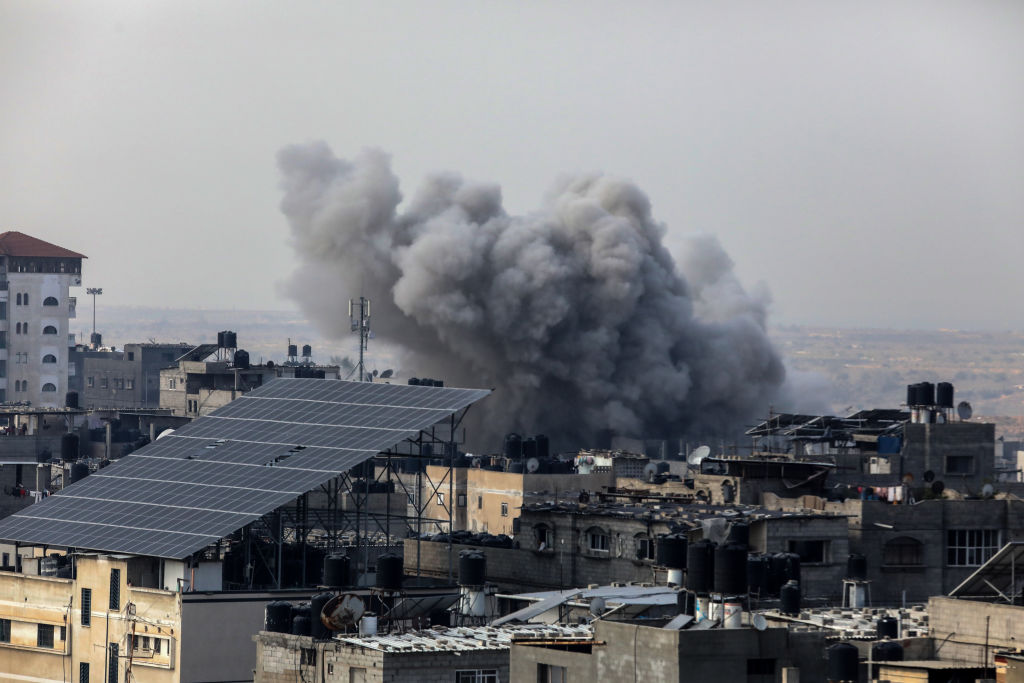
As a week-long truce between Israel and Hamas ended Friday, with Hamas firing a barrage of rockets into Israel and the Israeli military renewing combat operations in the Gaza Strip, one thing became abundantly clear: The war won’t be ending any time soon.
Despite a pause in fighting that stirred hope among some that the beginning of the end could be near, the two sides have reignited the conflict. “We're ready and preparing ourselves to keep on this mission for as long as it takes,” says Richard Hecht, an Israel Defense Forces (IDF) spokesperson.
Each side blamed the other for the breakdown in negotiations. On Thursday, Hamas killed four Israelis in a terrorist attack in Jerusalem and launched more rockets into Israel, which Israel said violated the ceasefire. By Friday, Israel struck Gaza with a series of air raids and announced plans for a high-intensity operation to target Hamas installations in the southern part of the Strip. The IDF also released a map to lead Palestinian non-combatants out of harm’s way. The war’s toll on civilians in Gaza has been an intense concern for the international community, with the Hamas-run Gaza Health Ministry claiming more than 15,000 Palestinians have been killed in Israeli air strikes. Those figures do not distinguish between civilians and combatants.
Israel says it will not stop the war until it completes its stated objective of dismantling Hamas’s military infrastructure and eliminating the terror group as the ruling power in Gaza. That goal has widespread support from the Israeli public after Hamas militants infiltrated southern Israel on Oct. 7 and killed roughly 1,200 people, mostly civilians. “If we don't destroy Hamas, our existence here is in jeopardy,” says Ophir Falk, a foreign policy adviser to Israeli Prime Minister Benjamin Netanyahu.
The United States, Israel, and Hamas were in the “sweet spot” during the seven-day pause when Israel was releasing three Palestinian prisoners in exchange for one Israeli hostage, most of whom were women and children, says David Makovsky, a former State Department official in the Obama administration.
“Israel wants its hostages out. Biden certainly wants the hostages out and wants to give the humanitarian trucks and everything more time to reach people. And Hamas wants their prisoners out and to regroup,” Makovsky says. “So long as you’re talking about women and children, everyone’s happy. The question is, at what point does Hamas turn the tables and say they’ve depleted all of those categories. Now they’re dealing with prime-age males and IDF soldiers, who they see very differently, and want to see Israel empty its prisons of killers. That is going to create a gut-wrenching debate in Israel.”
For Israel, that prospect invokes a painful precedent. In 2011, Israel exchanged more than 1,000 Palestinian prisoners to secure the release of Gilad Shalit, an IDF soldier Hamas held in captivity for more than five years. One of the Palestinians' prisoners freed was Yahya Sinwar, a Hamas military commander who became the mastermind behind the Oct. 7 massacre. (While in prison, Israel saved his life by performing brain surgery on him to remove a fatal tumor.)
But while another such deal does not appear imminent, some Israeli officials say that a swap to rescue the remaining hostages will come under a different context than the Shalit exchange. “All of these approved deals are under the premise that we will destroy Hamas,” Falk says. “So if we destroy Hamas, after all these deals are done, then the ramifications of these swaps are less lethal than in the past. That's the reason it was able to be approved by the cabinet.”
Put another way: Israelis may be willing to accept releasing Hamas terrorists back into Gaza if their days would be numbered there anyway.
In that vein, Israel is embarking on a more maximalist mission in the Gaza Strip than in any previous conflicts, when the objective was to contain the Islamist group and bolster Israel’s regional deterrence. Netanyahu and the war-time unity cabinet have vowed to tear Hamas out of Gaza completely, in what many suspect will become one of Israel’s longest and deadliest wars.
Israeli officials estimate that failing to eliminate Hamas after it carried out the worst terrorist attack against the Jewish State would embolden its arch-enemy Iran and its proxies, including Hamas. That could lead to a cascade of more terrorism, Israel worries, that would pose an existential threat to Israel and Jewish people worldwide. “If we do not complete the job, the message here in the region, and for other radical Islamists across the globe, will be extremely dangerous,” says Amichai Chikli, Israel’s Minister of Diaspora Affairs.
Viewed from outside, the costs of that conviction appear to be rising. The resumption in fighting came less than 12 hours after Secretary of State Antony Blinken visited Israel on Thursday, when he told Netanyahu that the devastating assault on northern Gaza in the first weeks of the war could not be repeated in the south, where roughly one million Palestinians have fled to since Israel began its bombardment of Gaza City. Blinken also warned the Israeli cabinet that the longer the war plays out, the more pressure will build on the U.S. and Israel to end it.
But while global pressure grows, Israeli officials insist they won’t constrict themselves to any timeline. “For several decades, there was this assumption that maybe we can live beside the monster,” Chikli says. “We cannot live near the monster. The monster must be destroyed.”
More Must-Reads from TIME
- Why Biden Dropped Out
- Ukraine’s Plan to Survive Trump
- The Rise of a New Kind of Parenting Guru
- The Chaos and Commotion of the RNC in Photos
- Why We All Have a Stake in Twisters’ Success
- 8 Eating Habits That Actually Improve Your Sleep
- Welcome to the Noah Lyles Olympics
- Get Our Paris Olympics Newsletter in Your Inbox
Contact us at letters@time.com